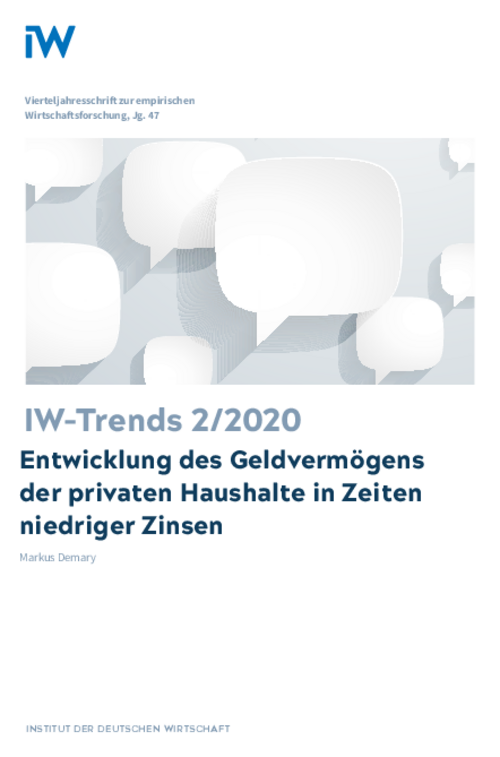Savers in Germany have been unsettled by the low interest rate policy of the European Central Bank. This prompts the question as to how such a sustained phase of low interest rates has affected the development of household financial assets.

Growth of Household Financial Assets in Times of Low Interest Rates
IW-Trends

Savers in Germany have been unsettled by the low interest rate policy of the European Central Bank. This prompts the question as to how such a sustained phase of low interest rates has affected the development of household financial assets.
To provide an answer, three different periods of monetary policy are compared: firstly, the period before the global financial market crisis in 2008; secondly, the period during and immediately after both this crash and the Eurozone crisis of 2011/2012, which included several years of stagnation in the countries affected; and, thirdly, the long period of upswing after the two crises, when, despite the recovery, interest rates not only remained low but actually fell. The comparison shows that financial assets in Germany increased slightly more after the Eurozone crisis than in the precrisis period. By contrast, in the comparator group consisting of Belgium, France, Luxembourg, the Netherlands, Austria and Finland growth in financial assets was weaker than before the crises. The increase in household financial assets in Germany cannot be ascribed solely to the positive development of the stock market, since cash and bank deposits have also risen sharply, especially in the post-crisis period.

Markus Demary: Growth of Household Financial Assets in Times of Low Interest Rates
IW-Trends

More on the topic

The Energy Dependence of Bank Loans
Russia's war against Ukraine has highlighted the vulnerability of the Federal Republic of Germany to Russian energy imports, especially natural gas.
IW
This time is different but still risky: Banking crisis instead of financial crisis
The current crisis of some American and European banks inevitably triggers fears that an international banking crisis could lead to a new financial crisis. But things in 2023 are very different from those in 2007.
IW